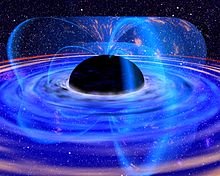The Universal Processor
I just read this really cool article over at Science Daily about a random number generator on a chip. What makes this chip special is that it uses a laser to detect the movements of the molecules in air to achieve a truly random number.
See, most random number generators written in software code are at least somewhat deterministic. Humans are not really capable of writing a true random number generator, so scientists have figured out a way to use nature to generate random inputs for us.
That chip can generate random numbers at gigabit speeds, more than enough capacity to provide us with real time encryption for everything, all around. This would be practically unbreakable encryption since there is no way to predict how air molecules move, at least, not yet. And in a year or two, they will package it for use in computers, phones and other devices that require secure communications.
As I read that article, I was reminded of "The Information Paradox", a thought experiment that considers what happens to matter in a black hole. In astrophysics, a black hole is a collapsed star, usually a remnant of a supernova. Black holes are super dense objects with very intense gravity. They get their name because their local gravity is so strong that not even light can escape.
The Information Paradox comes from asking the question:
Does matter disappear inside a black hole?
No, it cannot, because that would mean the loss of information. Here is the summary from the topic at Wikipedia:
Artist's representation of a black hole
The black hole information paradox[1] is a puzzle resulting from the combination of quantum mechanics and general relativity. Calculations suggest that physical information could permanently disappear in a black hole, allowing many physical states to devolve into the same state. This is controversial because it violates a core precept of modern physics—that in principle the value of a wave function of a physical system at one point in time should determine its value at any other time.[2][3] A fundamental postulate of the Copenhagen interpretation of quantum mechanics is that complete information about a system is encoded in its wave function up to when the wave function collapses. The evolution of the wave function is determined by a unitary operator, and unitarity implies that information is conserved in the quantum sense.
Just as a side note, this part caught my eye:
[T]he value of a wave function of a physical system at one point in time should determine its value at any other time.
Huh. Kind of like a universal block chain.
Anyway, long ago, I began to consider the universe an an information processor. I even wrote about that concept somewhere in my old blog, but I don't remember where that is anymore. I like to think of the universe as a universal processor because everything is information, and the universe is always processing information.
That random number generator chip makes use of the molecules in air as an information generator, too. That is a really neat way to do it. We could also use waves in the ocean, the wind, or the oscillation of lava in a caldera. But for computers, we need something that is fast. Air molecules are fast and they run on their own power, a power we don't quite comprehend. A power that we cannot yet predict. The best we can do is estimate a probability.
To give you an idea of what I mean by random, let me share with you my experience in high school biology class. I can recall peering into a microscope to see bacteria, tiny, single-cell animals. While the bacteria seem to be moving along at their own pace, I also see specs of dust in the water, but they're not still. They're being batted around by vibrating water molecules. That's an effect called, 'Brownian Motion". To get a sense of what that looks like, check out this short video. Brownian Motion is random. Completely random.
That's why I think that random number generator on a chip is so interesting. Using the movement of air to generate random numbers is genius, and almost completely removes human influence from the process of creating random numbers.
Almost? Well, scientists have also figured out that it's impossible to observe an experiment without influencing the outcome. Hopefully, even when we observe the movement of air molecules, they're still random movements. I think that even with our "observing" the air molecules in that random number generator chip, it will still be good enough for us to use. ;)
Write on.


Slogan by @tecnosgirl
Plan B for Humanity
A basic guaranteed income in the context of Maslow's Hierarchy of Needs
A sort of political movie review: Star Wars: Rogue One
Happiness isn't getting everything you want - happiness is a skill
The opposite of love is not hate, it is apathy
A short but growing list of people I admire, who have helped me, and/or influenced me, my thinking and/or my posts:
- @taskmaster4450 - The Age of Abundance is here
- @scottsantens - The Age of Universal Basic Income is here
- @gric - A very cool artist with some interesting perspectives
- @gringalicious - great writing, cooking and photography
- @luzcypher - for teaching me about how gift economies work

I saw your bit about using air molecules as a random number generator, and I raise you this random number generating apparatus that works in vacuum!
https://www.popsci.com/science/article/2012-04/ultimate-random-number-generator-conjures-digits-noise-vacuum
Apparently it works by listening to quantum noise!
Now that is wicked. And beats mine by 6 years. It's only a matter of time before they put that on a chip, too.
Remember that expression, "If a tree falls in the forest, does anybody hear?"
I wonder if that quantum fluctuation even exists if no one is there to observe it. What if we're all in a Dungeons and Dragons game that only appears when we traverse the space.
Huh.
Well, thanks for pointing that one out to me. I will just ponder for a day or two to see if an article pops out. :)
Oh, did some more digging from your link. They've been using nature for random number generation since at least 1998. Cool.
https://www.random.org/
This reminds me of Schrödinger's cat. If no one is observing, objects can exist in multiple states.
Quantum mechanics are so mind boggling yet such fun to ponder about.
Mind boggling indeed. Richard Feynman has quoted as saying, "If you think you understand quantum mechanics, you don't understand it."
The fact that so few people, if any really, understand the basic operation of the universe and how it functions, is the very reason why I'm agnostic about everything.
Great article. Loved it.
I'm glad you liked it. :)
Congratulations! This post has been chosen as one of the daily Whistle Stops for The STEEM Engine!
You can see your post's place along the track here: The Daily Whistle Stops, Issue 208 (7/27/18)
The STEEM Engine is an initiative dedicated to promoting meaningful engagement across Steemit. Find out more about us and join us today.